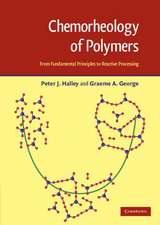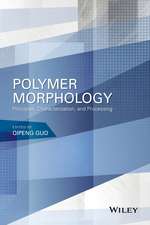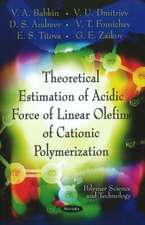Biomaterials for Tissue Engineering Applications: A Review of the Past and Future Trends
Editat de Jason A. Burdick, Robert L. Maucken Limba Engleză Paperback – 13 dec 2014
Preț: 1229.91 lei
Preț vechi: 1499.88 lei
-18% Nou
Puncte Express: 1845
Preț estimativ în valută:
235.34€ • 245.71$ • 194.78£
235.34€ • 245.71$ • 194.78£
Carte tipărită la comandă
Livrare economică 05-19 aprilie
Preluare comenzi: 021 569.72.76
Specificații
ISBN-13: 9783709116609
ISBN-10: 3709116600
Pagini: 576
Ilustrații: X, 564 p.
Dimensiuni: 155 x 235 x 30 mm
Greutate: 0.79 kg
Ediția:2011
Editura: SPRINGER VIENNA
Colecția Springer
Locul publicării:Vienna, Austria
ISBN-10: 3709116600
Pagini: 576
Ilustrații: X, 564 p.
Dimensiuni: 155 x 235 x 30 mm
Greutate: 0.79 kg
Ediția:2011
Editura: SPRINGER VIENNA
Colecția Springer
Locul publicării:Vienna, Austria
Public țintă
ResearchCuprins
I. Introduction. -II. -.Biomaterials Technologies for Tissue Engineering;Hydrogels in Tissue Engineering; Fibrous Scaffolds; Natural Materials; High Throughput Technologies; Self-Assembling Peptides; Elastomeric Materials; Micro-Technology; Nanomaterials in Tissue Engineering; Green Materials; Controlling Stem Cells with Materials; Ceramics in Tissue Engineering; Engineered Protein Materials. -III. -.Specific Applications in Tissue Engineering; Cartilage Tissue Engineering; Tendon/Ligament Tissue Engineering; Bone Regeneration; Liver Tissue Engineering; Cardiac Tissue Engineering; Vascular Tissue Engineering; Neural Tissue Engineering.IV. Translation of New Tissue Engineering Materials to Clinical Application.-V. Conclusions and Summary. Individual Chapter Outlines:Introduction.-Concepts in Material Development.-Review of Past Work.-Future Directions.-References
Recenzii
From the book reviews:
“This is an outstanding book on biomaterials used in organ regeneration. … This is the best most, up to date discussion of bio and cellular engineering. It is suitable for bioengineering specialists and students at the graduate level.” (Joseph J. Grenier, Amazon.com, August, 2014)
“This is an outstanding book on biomaterials used in organ regeneration. … This is the best most, up to date discussion of bio and cellular engineering. It is suitable for bioengineering specialists and students at the graduate level.” (Joseph J. Grenier, Amazon.com, August, 2014)
Notă biografică
Dr. Jason A. Burdick is the Wilf Family Term Assistant Professor in the Department of Bioengineering at the University of Pennsylvania, USA. He obtained his undergraduate degree in Chemical Engineering at the University of Wyoming (1998) and his PhD in Chemical Engineering at the University of Colorado (2002). He began his position at Penn after postdoctoral work (2003-2005) at the Massachusetts Institute of Technology. The focus of work in his laboratory is the development of biodegradable polymers for applications in tissue engineering and drug delivery. Much of this work focuses on the engineering of cartilage tissues, including articular cartilage and the knee meniscus, as well as biomaterial approaches to attenuate outcomes after myocardial infarction. Additionally, much of this work is focused on using material cues to alter stem cell behavior, including with spatial and temporal control. He has received several research awards, including a K22 Scholar Development and Career Transition Award from the National Institutes of Health, a Fellowship in Science and Engineering from the David and Lucille Packard Foundation, an Early Career Award from the Wallace H. Coulter Foundation, and a CAREER Award from the National Science Foundation. Additionally, his work is supported by funding from the National Institutes of Health and the Department of Veterans’ Affairs. He has published over 75 peer-reviewed papers and is on the editorial boards of the Journal of Biomedical Materials Research A, Biomedical Materials, and Tissue Engineering. Dr. Robert Mauck is an Assistant Professor of Orthopaedic Surgery and Bioengineering at the University of Pennsylvania, USA. He obtained his undergraduate degrees in Biochemistry and Biomedical Engineering at Columbia University (1998), and completed his PhD at Columbia in the Cellular Engineering and Musculoskeletal Biomechanics Laboratories (2003). After postdoctoral studies (2003-2005) at the National Institutes of Health inthe Cartilage Biology and Orthopaedics Branch, Dr. Mauck developed a new research program in the McKay Orthopaedic Research Laboratories at the University of Pennsylvania. His group focuses on the engineering of musculoskeletal tissues, with a particular interest in restoring articular cartilage, the knee meniscus, and the intervertebral disc. Dr. Mauck’s team uses rigorous mechanical and molecular analyses to characterize native tissue structure and function and employs this information to enhance the functional properties of engineered constructs through focused technology development. Specifically, this work employs adult mesenchymal stem cells, custom mechanobiologic culture conditions, and novel cell scaffolding technologies. His work is supported with funding from the National Institutes of Health, the Veterans’ Administration, as well as several private foundations. Dr. Mauck was awarded the 2008 ISSLS Prize in Biomechanics and the 2009 YC Fung Young Investigator Award from the ASME. Dr. Mauck has published more than 60 manuscripts in the field of tissue engineering and regenerative medicine.
Textul de pe ultima copertă
A concise overview of tissue engineering technologies and materials towards specific applications, both past and potential growth areas in this unique discipline is provided to the reader. The specific area of the biomaterial component used within the paradigm of tissue engineering is examined in detail. This is the first work to specifically covers topics of interest with regards to the biomaterial component. The book is divided into 2 sections: (i) general materials technology (e.g., fibrous tissue scaffolds) and (ii) applications in the engineering of specific tissues (e.g., materials for cartilage tissue engineering). Each chapter covers the fundamentals and reflects not only a review of the literature, but also addresses the future of the topic. The book is intended for an audience of researchers in both industry and academia that are interested in a concise overview regarding the biomaterials component of tissue engineering, a topic that is timely and only growing as a field.
Caracteristici
Overview of specific topic within the field of tissue engineering written by tomorrow´s leaders of the field Includes over 100 figures to illustrate technology development Covers both general technologies and specific applications Tissue Engineering from a Materials Science perspective












